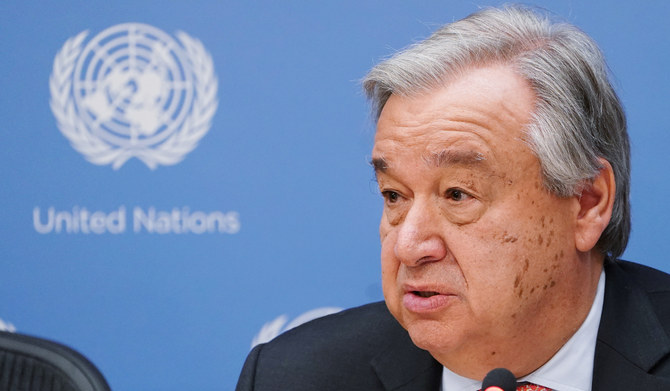CAIRO: The head of the United Nations has praised Egypt for its efforts to achieve a ceasefire in the Gaza Strip and its commitment to keeping the Rafah border crossing open since the start of the conflict.
UN Secretary-General Antonio Guterres was received by Egyptian President Abdel Fattah El-Sisi in Cairo on Sunday.
The pair discussed a range of international and regional issues, with an emphasis on developments in the Gaza Strip. They agreed that a two-state solution was the only path to achieving justice, security and stability and highlighted the need to create conditions conducive to its implementation, a presidential spokesperson said.
El-Sisi highlighted the danger linked to some countries’ decision to suspend funding for UNRWA, the UN agency that supports Palestine refugees, which has been seen as a form of collective punishment.
The meeting also discussed efforts to reach an immediate ceasefire, free hostages and implement humanitarian aid, whether by land, in coordination with the relevant UN agencies, or through air drops, particularly over northern areas of the Gaza Strip.
El-Sisi said he appreciated Guterres’ keenness to adhere to the principles of international law and international humanitarian law and continued efforts to urge the international community to act to help end the hostilities and protect civilians.
It was important for the UN Security Council to assume its responsibilities in these matters, he said.
Guterres, who visited the Rafah crossing on Saturday, praised Egypt for its efforts in leading the process of delivering aid to the people of Gaza in the face of severe obstacles and difficulties.
He reiterated the importance of a ceasefire for humanitarian purposes to enable the delivery and distribution of aid.
The meeting, which was also attended by Egypt’s Foreign Minister Sameh Shoukry, General Intelligence Service Director Maj. Gen. Abbas Kamel, UNRWA Commissioner General Philippe Lazzarini and UN Resident Coordinator in Egypt Elena Panova, rejected any displacement of Palestinians from their lands.
It also warned against any military operation in Rafah, which would have “catastrophic consequences.”
Guterres and Shoukry held extended talks after which they took part in a joint press conference.
The discussions dealt with a range of issues, most notably the need to end the war in Gaza and ensure the flow of humanitarian aid.
Guterres said that the manner in which Israel had carried out its military operations in the Gaza Strip violated international law and that it must remove obstacles to the relief effort.
He added that the UN was working to ensure sufficient funding for UNRWA to enable it to fulfill its obligations to the Palestinian people and said the only effective way to transfer aid to Gaza was via land crossings.
The international community was facing a credibility crisis as the attacks continued, Guterres said.
“Horror & starvation stalk the people of Gaza,” he wrote on X.
“Any further onslaught will make everything worse. Worse for Palestinian civilians, for the hostages, for all people of the region. It’s more than time for an immediate humanitarian ceasefire & the immediate release of all hostages.”

























